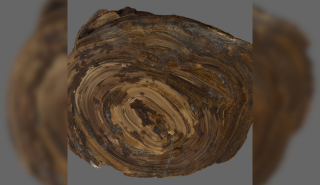World’s oldest stomach stone fossil found on Jurassic Coast
07 July 2023

A 150-million-year-old stomach stone has been found in the UK, making it the oldest discovered fossil of its kind.
Found by renowned palaeontologist Dr Steve Etches MBE, in Kimmeridge, Dorset, the fist-shaped fossil originates from the Jurassic era. The relic is 59 million years older than the oldest known fossilised stomach stone.
Nigel Larkin, palaeontologist and Visiting Research Fellow at the School of Biological Sciences at the University of Reading, led the study, published in Proceedings of the Geologists’ Association this week. Upon its discovery, Nigel was immediately sure that the fossil was of a biological origin rather than a geological origin.
He said: “I was fascinated by this very curious mystery object and was determined to discover what it was.
“Unless stomach stones are actually found preserved within a skeleton it is almost impossible to tell what sort of animal it might have formed inside.
“The size of this stomach stone, and considering it was found in clay from the Upper Jurassic era, indicates it most likely formed inside a large marine reptile such as an ichthyosaur, plesiosaur, pliosaur or crocodilian. The stomach stone did not come from a dinosaur - as dinosaurs lived on land - but this is still a very exciting and rare discovery.”
Biological origins
The fossil was found on the Jurassic Coast at Kimmeridge, Dorset, by sharp-eyed palaeontologist Dr Steve Etches MBE. Upon discovering the specimen, the fossil collector passed it on to fossil experts who dismissed the specimen as something formed by geological processes. The stone was then passed on to Nigel Larkin, who compared it to material in the collections of the Royal College of Surgeons, England, and the UCL Pathology collections. He soon identified it as a ‘calculus’ – a stomach stone, bladder stone, kidney stone or similar, due to its very specific internal structure.
These mineral ‘stones’ can form naturally in any animal, not just humans, under certain dietary or environmental conditions. Ancient examples have been discovered in Egyptian mummies but only a handful have been discovered in the fossil record. It is suspected that more must exist, but they have not been recognised for what they are.
Dr Ivan Sansom, Senior Lecturer in Palaeobiology at the University of Birmingham, carried out microscopic analyses of the stone to determine the exact structure of the specimen and what minerals it was made of. He concluded the specimen has all the characteristics of a calculus, in fact one formed in a gastro-intestinal tract - known as a ‘stomach stone.’
Growing collection
This very rare find adds to the diverse and exceptional range of unusual fossils discovered in the Kimmeridgian cliffs by Dr Steve Etches. Believed to be 150-million-years-old, the find extends the range of known calculi (stomach stones, bladder stones etc) in the fossil record by almost 59 million years. It also confirms their occurrence in marine palaeoenvironments rather than just terrestrial deposits. It is the only specimen known to have been found in the UK.
Steve’s extensive collection of Jurassic fossils is world-famous and is now housed in its own museum, open to the public, on the coast where the fossils have been found. The collection contains the skeletons of prehistoric fish, ichthyosaurs, pliosaurs, plesiosaurs and pterosaurs.

